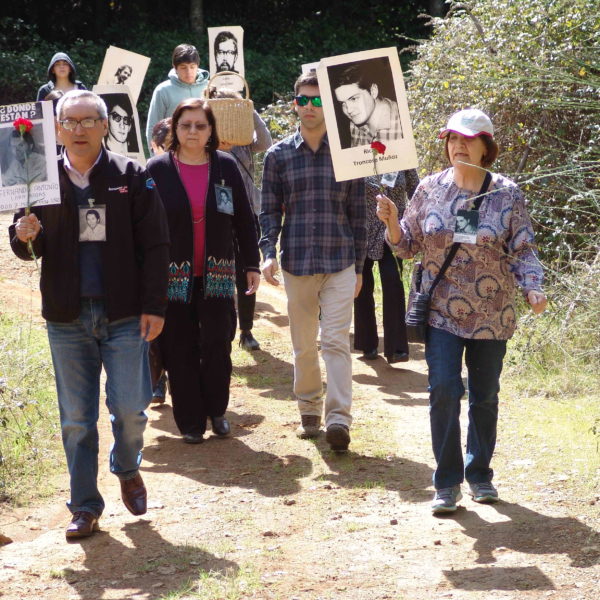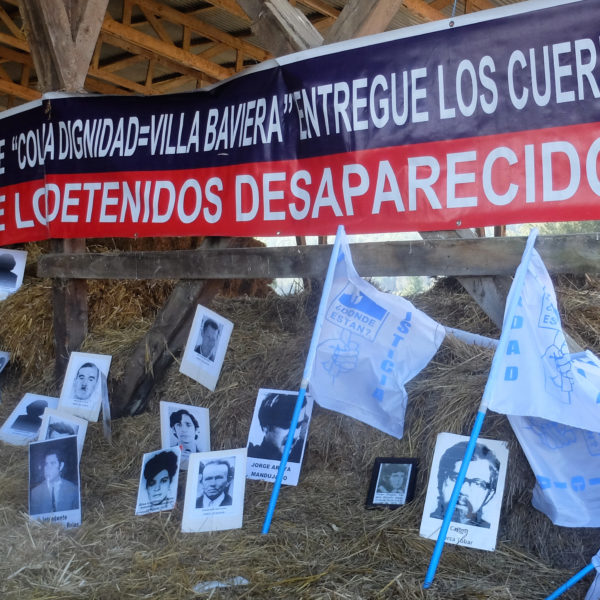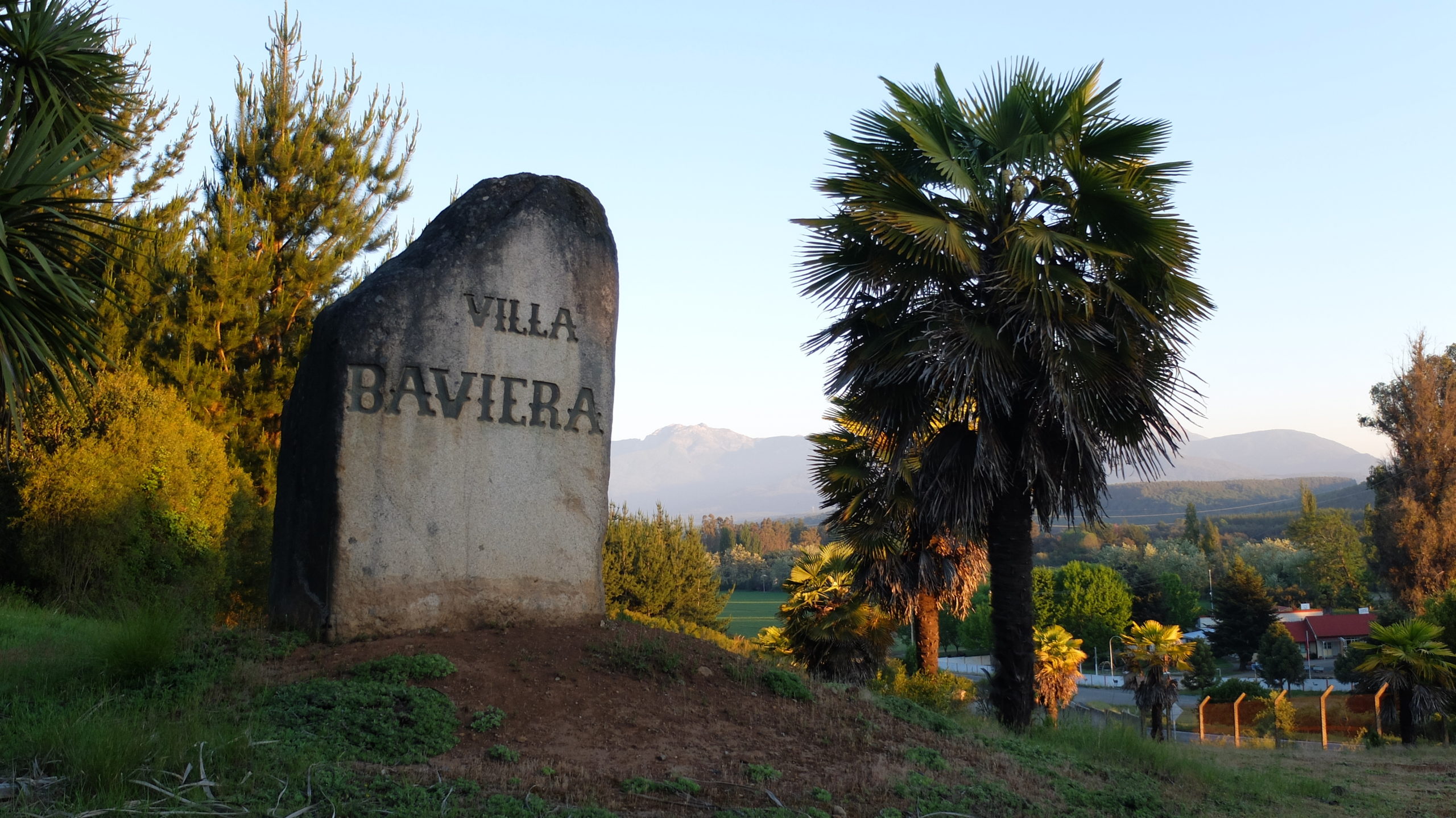(18.04.2023, nd/npla) It is almost 50 years since Augusto Pinochet’s military junuta in Chile overthrew the democratically elected socialist President Salvador Allende and since this coup was celebrated on September 11, 1973 in the Colonia Dignidad. The Chilean secret service DINA then set up a prison camp on the site of the German cult settlement. Hundreds of opponents of the dictatorship (1973 to 1990) were tortured there, dozens were murdered and disappeared, their fate and whereabouts have not been clarified to this day.
“The mothers of the disappeared die without knowing how and where their relatives were murdered,” says Myrna Troncoso Muñoz, whose brother Ricardo was arrested in 1973 and has since disappeared. “We need a place to mourn and want the suffering that happened in Colonia Dignidad to be represented there.”
Bavarian style tourism
But instead, a tourism business in the Bavarian style is thriving in the settlement, in which around 120 people live today and which is now called Villa Baviera. Guests come mainly for the good food, the fresh air and the tranquility of the idyllic location at the foot of the Andes. To this day, there is no memorial or documentation center: neither for the political prisoners who were tortured on the site and who disappeared, nor for the Chileans from the area or the residents of the German settlement founded in 1961, the so-called “Colonos”, who were subjected to forced labor and sexualised violence for decades. “Tourism for pleasure is shameful and must be stopped,” explains journalist Gabriel Rodríguez. He was mistreated as a prisoner in Colonia Dignidad in 1976 but survived. “The most important thing is to set up a memorial on the site,” he says today.
The most important thing is to set up a memorial on the site

In 2016, Frank-Walter Steinmeier conceded that Germany shared moral responsibility. Because German authorities knew about the crimes of the Colonia Dignidad, founded in 1961, but did not prevent them. They even maintained good relations with the sect leadership around the German lay preacher Paul Schäfer. All of the crimes went unpunished by the German judiciary. But in 2017, the German Bundestag unanimously decided to work up the crimes of Colonia Dignidad – also by establishing a memorial, documentation and learning site.
The “Mixed Commission for the Study of Colonia Dignidad” founded by the governments of Chile and Germany could now also decide this. On April 18, Chilean government officials will travel to Berlin for a crucial meeting. The Federal Foreign Office states that the federal government is working together with the Chilean government to set up a memorial and refers to the statement by Chancellor Scholz, who “confirmed this during his most recent visit to Chile at the end of January 2023 [hat]that Germany will support the Chilean government in this project and will make its contribution”.
However, in 2018 Angela Merkel and the then President of Chile Sebastián Piñera announced together during a state visit to Berlin: “We are working on an agreement to set up a documentation center”. Foreign Minister Baerbock has not yet taken a position on the subject of Colonia Dignidad, and there is no discernible vision or strategy. The current constellation with the traffic light government in Germany and the left-wing government under Gabriel Boric in Chile is favorable and opens a window of opportunity for the erection of a memorial.
A concept for a memorial has already been drawn up
The mixed commission had already had a concept drawn up by two German and two Chilean experts. Accordingly, the history and suffering of all groups of victims should be presented in the memorial, documentation and learning site: the disappeared and the political prisoners, those affected by slave-like work, sexualised violence, forced adoption and rural expulsion.

However, the assessments of those affected regarding the practical implementation differ widely. The representative of the association of relatives of the disappeared from the Chilean region of the Maule River, Myrna Troncoso, is very unsettled. Chilean members of the Joint Commission told her last week that no memorial could be erected, she assures her. Because on the Chilean and also on the German side there is a lack of money for the financing.
Former political prisoner Gabriel Rodríguez, on the other hand, welcomes the announcements by Chilean government officials that they want to set up a foundation with the aim of establishing a memorial and by then installing twelve plaques on historically significant objects that should become part of this memorial.
Commemoration – and living?
Anna Schnellenkamp grew up in the German settlement. Today she manages the tourism business and is involved in a social AG for internal affairs in the Villa Baviera. She emphasizes that many residents are positive about the establishment of a memorial site, provided they can continue to live on the site and are given appropriate living space. The social working group spoke to members of the mixed commission about this. In addition, the social AG hopes for professional support in clarifying the unfair distribution of shares and property in the Villa Baviera and has submitted a corresponding application to the German-Chilean government commission, according to Schnellenkamp.
clarification of ownership
The Villa Baviera is structured as a non-transparent company holding nested closed stock corporations. Power and fortune are in the hands of a few people. The “clarification of the ownership structure of Colonia Dignidad/Villa Baviera, also with the aim that funds from the property specifically benefit the victims”, is also part of the work-up demanded by the German Bundestag in 2017. So far, the Society for International Cooperation has gained insight into the books of the stock corporations and has prepared a feasibility study for a more detailed investigation of the financial situation for more than 100,000 euros. However, the results remain under lock and key, since the management of the company holding company had agreed to secrecy.
If progress were made on this route, the (ex-)colonos, who live under very precarious conditions, could also benefit. These include, above all, those who have left Villa Baviera and live elsewhere in Chile. “We, who live outside, are on our own and need support most urgently,” says Doris Gert, who grew up in Colonia Dignidad and had to work there for decades without pay. Doris Gert now lives with her family in southern Chile and does odd jobs. She and around 150 other victims of the sect received one-off payments of up to 10,000 euros from the German state through an aid concept from the federal government. A “Fund for care and old age” that was also decided for those affected living in Chile outside of the Villa Baviera has not yet been implemented.
Doris Gert does not receive any government support, nor does she benefit from the facilities at Villa Baviera, which are supported with German tax money. The German state is currently financing the staff of the old people’s and nursing station in the settlement with almost 100,000 euros a year.
This article is first in in a slightly different form New Germany appeared.
![]() Colonia Dignidad – Not a place of mourning and admonition by News Pool Latin America is licensed under Creative Commons Attribution-Share Alike 4.0 international.
Colonia Dignidad – Not a place of mourning and admonition by News Pool Latin America is licensed under Creative Commons Attribution-Share Alike 4.0 international.
